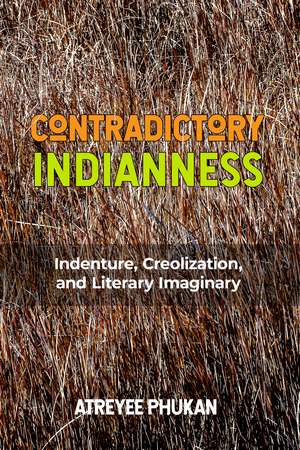Contradictory Indianness: Indenture, Creolization, and Literary Imaginary: Critical Caribbean Studies
Autor Atreyee Phukanen Limba Engleză Paperback – 15 iul 2022 – vârsta ani
As Contradictory Indianness shows, a postcolonial Caribbean aesthetics that has from its inception privileged inclusivity, interraciality, and resistance against Old World colonial orders requires taking into account Indo-Caribbean writers and their reimagining of Indianness in the region. Whereas, for instance, forms of Indo-Caribbean cultural expression in music, cuisine, or religion are more readily accepted as creolizing (thus, Caribbeanizing) processes, an Indo-Caribbean literary imaginary has rarely been studied as such. Discussing the work of Ismith Khan, Harold Sonny Ladoo, Totaram Sanadhya, LalBihari Sharma, and Shani Mootoo, Contradictory Indianness maintains that the writers' engagement with the regional and transnational poetics of the Caribbean underscores symbolic bridges between cultural worlds conventionally set apart—the Africanized and Indianized—and distinguishes between cultural worlds assumed to be the same—indenture and South Asian Indianness. This book privileges Indo-Caribbean fiction as a creolizing literary imaginary to broaden its study beyond a narrow canon that has, inadvertently or not, enabled monolithic and unidimensional perceptions of Indian cultural identity and evolution in the Caribbean, and continued to impose a fragmentary and disconnected study of (post)indenture aesthetics within indenture’s own transnational cartography.
Din seria Critical Caribbean Studies
-
 Preț: 247.29 lei
Preț: 247.29 lei -
 Preț: 203.79 lei
Preț: 203.79 lei -
 Preț: 243.85 lei
Preț: 243.85 lei -
 Preț: 245.73 lei
Preț: 245.73 lei -
 Preț: 185.09 lei
Preț: 185.09 lei -
 Preț: 318.70 lei
Preț: 318.70 lei -
 Preț: 334.71 lei
Preț: 334.71 lei -
 Preț: 210.64 lei
Preț: 210.64 lei -
 Preț: 204.10 lei
Preț: 204.10 lei -
 Preț: 253.93 lei
Preț: 253.93 lei -
 Preț: 314.72 lei
Preț: 314.72 lei -
 Preț: 346.99 lei
Preț: 346.99 lei -
 Preț: 262.40 lei
Preț: 262.40 lei -
 Preț: 316.89 lei
Preț: 316.89 lei -
 Preț: 366.32 lei
Preț: 366.32 lei -
 Preț: 361.12 lei
Preț: 361.12 lei -
 Preț: 370.28 lei
Preț: 370.28 lei -
 Preț: 362.28 lei
Preț: 362.28 lei - 23%
 Preț: 778.69 lei
Preț: 778.69 lei -
 Preț: 359.13 lei
Preț: 359.13 lei - 23%
 Preț: 779.76 lei
Preț: 779.76 lei -
 Preț: 251.36 lei
Preț: 251.36 lei -
 Preț: 186.75 lei
Preț: 186.75 lei - 10%
 Preț: 910.98 lei
Preț: 910.98 lei - 10%
 Preț: 910.98 lei
Preț: 910.98 lei -
 Preț: 267.04 lei
Preț: 267.04 lei - 10%
 Preț: 910.98 lei
Preț: 910.98 lei -
 Preț: 360.09 lei
Preț: 360.09 lei -
 Preț: 323.83 lei
Preț: 323.83 lei - 10%
 Preț: 910.98 lei
Preț: 910.98 lei -
 Preț: 359.04 lei
Preț: 359.04 lei - 51%
 Preț: 498.27 lei
Preț: 498.27 lei -
 Preț: 405.13 lei
Preț: 405.13 lei
Preț: 283.84 lei
Nou
Puncte Express: 426
Preț estimativ în valută:
54.31€ • 58.08$ • 45.28£
54.31€ • 58.08$ • 45.28£
Carte disponibilă
Livrare economică 28 martie-11 aprilie
Livrare express 13-19 martie pentru 30.01 lei
Preluare comenzi: 021 569.72.76
Specificații
ISBN-13: 9781978829107
ISBN-10: 1978829108
Pagini: 244
Dimensiuni: 152 x 229 x 15 mm
Greutate: 0 kg
Editura: Rutgers University Press
Colecția Rutgers University Press
Seria Critical Caribbean Studies
ISBN-10: 1978829108
Pagini: 244
Dimensiuni: 152 x 229 x 15 mm
Greutate: 0 kg
Editura: Rutgers University Press
Colecția Rutgers University Press
Seria Critical Caribbean Studies
Notă biografică
ATREYEE PHUKAN is an associate professor of English at the University of San Diego in California. She is the co-editor of South Asia and Its Others: Reading the Exotic, and co-editor of Home and the World: South Asia in Transition.
Cuprins
Introduction: Indenture, Creolization, and Literary Imaginary
1. Passage and Poetics in Totaram Sanadhya and LalBihari Sharma
2. Repatriation and the “Indian Problem” in Ismith Khan’s The Jumbie Bird (1960)
3. The Trope of the Ricefield in Harold Sonny Ladoo’s No pain like this body (1972)
4. (En)Gendering Indenture in Shani Mootoo’s Cereus Blooms at Night (1992)
Conclusion
Acknowledgments
Bibliography
Index
1. Passage and Poetics in Totaram Sanadhya and LalBihari Sharma
2. Repatriation and the “Indian Problem” in Ismith Khan’s The Jumbie Bird (1960)
3. The Trope of the Ricefield in Harold Sonny Ladoo’s No pain like this body (1972)
4. (En)Gendering Indenture in Shani Mootoo’s Cereus Blooms at Night (1992)
Conclusion
Acknowledgments
Bibliography
Index
Recenzii
"This is an alternative Caribbean literary history that expands the scope of narratives available for a reading of the Indo-Caribbean through the inclusion of a diverse set of new as well as well-established literary texts. It resituates the idea of the Indo-Caribbean as an analogue to Afro-Caribbean creolizing processes; through this, it also reimagines the connection to India in the making of the indenture stories in the Caribbean. It is deeply observant and wide-ranging in its exciting explorations."
"Contradictory Indianness continues the urgent work of uncoupling Indo-Caribbean studies from glances backward at India and rightly identifies Indo-Caribbean literature as a radical and uniquely Caribbean project of challenging orthodoxies and forging belonging. In turning her attention to under-examined writers from the Indo-Caribbean canon, Phukan offers us both an astute explication of post-indentureship aesthetics and a more expansive understanding of how creolization plays out for Indo-Caribbean writers."
Descriere
As Contradictory Indianness endeavors to show, a postcolonial Caribbean aesthetics that has from its inception privileged inclusivity, interraciality, and resistance against Old World colonial orders requires taking into account Indo-Caribbean writers and their reimagining of Indianness in the region. This book’s unique contribution lies in an explicit privileging of Indo-Caribbean fiction as a creolizing literary imaginary to broaden its study beyond a narrow canon that has, inadvertently or not, enabled monolithic and unidimensional perceptions of Indian cultural identity and evolution in the Caribbean.
